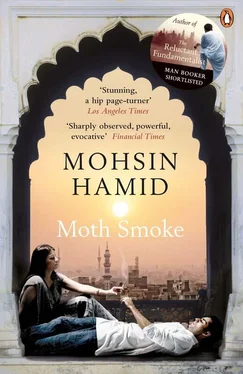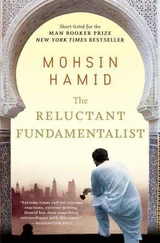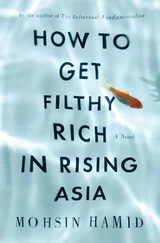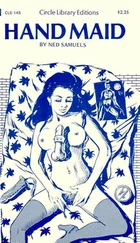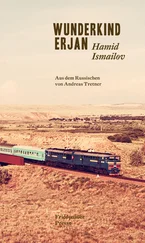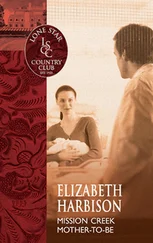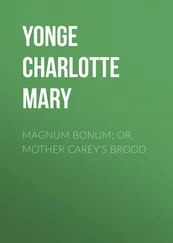I look around. A crowd has gathered to stare, but no one does anything. I put my hands under the boy to lift him. The back of his head is soft and sticky, and I swallow against what rises in my stomach as I smell the smell. Another man helps me, and together we place him on the back seat of my car and drive quickly to Services Hospital.
I press down on my horn until two orderlies rush out to put the boy on a trolley and wheel him inside. Then I tell the man who came with me to stay and talk to the police until I return.
Ozi lives just off Main Gulberg Boulevard, so I’m at his place in a few minutes, punching my horn with the side of my hand again and again. The guards must know me by now, because they open the gate and let me in.
The red Pajero is parked in the driveway, Ozi watching a servant wipe the dent in its bumper with a wet cloth. My best friend is wearing sunglasses, a bright T-shirt, and knee-length shorts. He looks like an overgrown child. A child who gets everything. Gets away with everything.
I step out of my car and say very softly, ‘I saw you just now.’
For a moment he watches me, silent, expressionless, as though he’s trying to remember who I am. No, not remember: decide. Decide who I am.
Then he hangs his head. His shoulders fall. ‘There was nothing I could do. I didn’t see him until the last moment.’ He looks into my eyes, begging to be believed.
‘It was a red light.’
‘Do you think he’s okay?’
I shake my head.
Ozi’s lips stretch. Flatten. Not a smile: a twitch. ‘We’ll take care of his family,’ he says. ‘I’ll make sure they’re compensated.’
My throat constricts, choking me. I want to speak, but I can’t work my voice.
Fingers curl, hands become blunt. Lungs half-fill, then lock, rib cage and chest now armor.
I focus on the underside of his jaw. His Adam’s apple. The soft flesh there.
Ozi sees the violence in me. Recognizes it.
And, gently, he takes hold of my arm.
‘Daru?’
Something claws its way out of me, tearing, ripping, forcing my eyes shut, as powerful and vicious as a sob.
And then it’s gone, my anger, dispelled by his touch, by the tone of his voice. I feel weak and sick. Sunstroke. Dehydration. But I can speak again. ‘I’m going back to the hospital.’
‘Don’t tell them about me.’
I don’t answer. I turn and get back into my car, rubbing my eyes with my fingers as I reverse out of the driveway. The back seat is covered with blood.
When I arrive at the hospital, a blue police jeep is already there and the cops are questioning the man who helped me bring in the boy. Their officer turns as I approach. ‘You brought the victim here in your car?’
‘Yes,’ I reply.
‘Then why did you leave?’ he asks suspiciously. ‘Where did you go?’
‘To look for the car that hit him,’ I answer. ‘But I couldn’t find it.’
I don’t say anything about Ozi. The officer tells me that the boy is dead and I’m to come with them to the police station. A policeman rides beside me in my car, a rifle between his thighs. ‘In case you don’t know the way.’
I’m led past an interrogation room, I suppose to impress upon me the need to be forthcoming. Inside, an old man is screaming that an atomic bomb incinerated his wife. A brawny interrogator slaps him again and again, saying, ‘It was you, it was you,’ in a frightened voice that belies the bored expression on his fat face.
It takes the police a long time to record my statement, and I’m left uncertain whether they consider me a witness or a suspect.
When Manucci sees the blood on the back seat of the car, he just stands there with his lips pressed together like a kiss and questions ballooning behind his eyes. But I take one look at him and say, ‘Clean it,’ and he jerks to attention, running for a bucket of water and a cloth.
I have a hard time sleeping that night. But I decide one thing: I’m not going to take any of Ozi’s father’s help in looking for a job.
It isn’t as hot as usual the next morning, so I’m still in bed when Manucci comes banging on my door.
‘What is it?’ I yell.
‘Saab, an andhi is coming,’ he says.
I get up and pull open the curtains. It’s dark, like late evening. ‘Shut all the windows,’ I say. ‘I’m going outside.’
Lahore could use an andhi, especially if it brings rain. There’s too much dust everywhere, and it’s too damn hot too early this summer.
I walk out to the banyan tree in front of the house, stepping on my heels because sticks and rocks on the dead lawn stab my feet. A dusty smell hanging in the still air reminds me of the storms of my childhood, when the lawn had been green and lush and I hid behind the banyan tree because my mother would have made me come inside, hid even as the storm broke, because the banyan tree sheltered me from the wind and dust until the rain began to fall, and I ran dancing in it while it soaked me and washed away the heat, leaving everything cool and clean, it seemed, for days.
The lawn has died since then, but the banyan tree is still alive, wound about itself like iron cable. Its branches hang low, their canopy casting a shade over roots that grip and break the soil, grasping in every direction. The tree is old, much older than the house and the boundary wall that seems almost to have been built to hold it in and against which the tree is now beginning to push.
For some reason I find myself doing what I used to do as a child, even though now there’s no one to hide from: going to stand in the lee of the banyan tree. I feel the pressure building around me, feel it between the hair of my forearms and the skin, along the back of my neck, the line of my shoulders.
The sun is completely blotted out by a dirty sky.
I shut my eyes as the wind picks up, whipping through the branches with a rising howl as dust sweeps over me, smoothly abrasive. The andhi builds, pushing me back a step, screaming in my ears, bending my outstretched arms as I stand my ground. It flings sand at me, sends leaves hurtling into me, but the tree breaks their force and I feel only brief touches on my skin.
Raindrops begin to shatter on my eyelids, on my ears, my throat, my stomach. The andhi roars now, violent and fully alive, and I keep my eyes closed as I wait for it to subside.
Suddenly something strikes my chest. My eyes snap open and I’m immediately blinded by the dust. I turn around and put my back to the wind, rubbing my fists into my stinging eyes. I fight to keep my balance, gasping, overwhelmed by the storm.
The andhi dies unexpectedly, without much rain.
My eyes are tearing and I open them, blinking to flush the dust out. I have a small cut on my chest, probably from a broken branch of the banyan tree. Around me everything is coated with dust, damp in patches from the spray. The sun is already burning a hole through the rusty clouds.
I’m filthy and it’s begun to get hot again. The wind blowing through the branches of the banyan tree carries the smell of parched land that has waited too long for too small a drink. Rubbing the dirt in the corners of my eyes and fingering the cut on my chest, I go inside to take another shower.
They say the nuclear tests released no radioactivity into the atmosphere. Each a huge gasp, smothered unsatisfied.
8
what lovely weather we’re having (or the importance of air-conditioning)
Your robes are itching and you crook a finger at one of your clerks.
‘Have we considered air-conditioning?’ you ask him.
‘One moment, Milord,’ he says, scurrying off.
He returns in a few minutes, hands you a sheaf of papers, and bows repeatedly. You are about to commence fanning yourself when the title page catches your eye: ‘Air-Conditioning,’ it says. Intrigued, you begin to read and encounter the following:
Читать дальше
